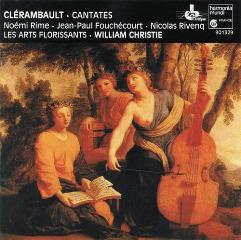L.N. Clérambault – Cantates (Christie) [1995]
L.N. Clérambault – Cantates (Christie) [1995]

1. Cantates, Pyrame Et Tisbe: Prld. Pirame, Pour Tisbe, Des La Plus Tendre Enfance. Sym - Jean-Paul Fouchecourt 2. Cantates, Pyrame Et Tisbe: Tisbe, Pour Resister A L' Ardeur De Ses Voeux - Jean-Paul Fouchecourt 3. Cantates, Pyrame Et Tisbe: Sym. Air: Vole, Vole, Dit-Elle Avec Amour - Jean-Paul Fouchecourt 4. Cantates, Pyrame Et Tisbe: Elle Cherchoit L' Amant Qui La Tient Asservie. Plainte - Jean-Paul Fouchecourt 5. Cantates, Pyrame Et Tisbe: Prld: Venez Monstres Affreux - Jean-Paul Fouchecourt 6. Cantates, Pyrame Et Tisbe: Air: Amour, Qui Voudra Desormais - Jean-Paul Fouchecourt 7. Cantates, La Muse De L' Opr Ou Les Caracteres Lyriques: Mortels, Pour Contenter Vos Desirs Curieux 8. Cantates, La Muse De L' Opr Ou Les Caracteres Lyriques: Tempeste: Mais Quel Bruit Interrompt Ces... 9. Cantates, La Muse De L' Opr Ou Les Caracteres Lyriques: Non, Les Dieux Attendris 10. Cantates, La Muse De L' Opr Ou Les Caracteres Lyriques: Sommeil: Vos Concs Heureux Oyseaux 11. Cantates, La Muse De L' Opr Ou Les Caracteres Lyriques: Prld Infernal. Ne Craignons Rien 12. Cantates, La Muse De L' Opr Ou Les Caracteres Lyriques: Air: Ce N' Est Qu' Une Belle Chimere 13. Cantates, La Mort D' Hercule: Au Pied Du Mont Eta - Nicolas Rivenq 14. Cantates, La Mort D' Hercule: Voy Perir Ce Vainqueur - Nicolas Rivenq 15. Cantates, La Mort D' Hercule: Au Seul Nom De L' Amour - Nicolas Rivenq 16. Cantates, La Mort D' Hercule: Il Dit, Et Se Livrant Au Transport Qui L' Anime - Nicolas Rivenq 17. Cantates, Orphee: Le Fameux Chantre De La Thrace 18. Cantates, Orphee: Mais Que Sert A Mon Desespoir 19. Cantates, Orphee: Allez Orphee 20. Cantates, Orphee: Cependant Le Heros Arrive 21. Cantates, Orphee: Pluton Surpris D' Entendre Des Accords Eric Bellocq – theorbo Marc Hantaï – flute Bruno Croscet, Hiro Kurosaki – violin Noemi Rime – soprano Jean-Paul Fouchécourt – tenor Nicolas Rivenq – bass William Christie - harpsichord Les Arts Florissants William Christie – conductor
Louis-Nicolas Clérambault came from and later added to a family known for its musical service to French royalty; his father, Dominique Clérambault, was a musician for the king's violin consort (an ensemble of 24 violinists!), and he himself served both at Versailles and at royal churches. Both his sons were musicians and organists for royal churches, and one of them, César François Nicolas, was also a minor composer. He was one of the most respected composers and performers of his time, and, like Campra, helped to lead French music out of the musical isolation that Lully had imposed, adding more melodiousness and energy to the delicacy and grace that had become almost the sole considerations for composition and performance. Also like Campra, he added a strong Italian influence, but with a French style; one contemporary quotation says that "If Campra writes modulations in the Italian style, [his music] speaks in the French style." He was also one of the first composers to give names to his sonatas.
His first music lessons were with his father, but his main musical influences were Jean-Baptiste Moreau and Andre Raison, his two organ and composition teachers. As his reputation spread, he was appointed to the organist position at Saint Louis and became part of the musical forces of Versailles, responsible (together with Madame de Maintenon, the king's mistress) for the music for the king's private concerts. In 1697, he published his Book of Airs, followed by his Book for the Harpsichord in 1702. In 1710, he produced the first of his five books of cantatas (his second was in 1713, his third in 1716, his fourth in 1720, and the last in 1726), as well as his Book for the Organ. When Madame de Maintenon retired to Saint Cyr, a school and royal church founded by the king for the daughters of impoverished military officers, and known for the quality of its musical education, he became organist and music master there. Many of his motets and cantatas were written for the Demoiselles de Saint-Cyr, the girls' chorus. In 1715, he was appointed main organist at Saint Sulpice, where he had served as a deputy for several years, and in 1720, to the same position at Saint Jacques. His one major stage work was an allegory, Le Soleil, Vainqueur des Nuages (The Sun, Conqueror of Clouds), celebrating Louis XIV's recovery from illness (Louis was known as The Sun King, and took particular pleasure in works that glorified this image) and first performed at the Opera. He had continued writing four more books of cantatas, the last of which was published in 1726. They were among his most popular works, and frequently performed at the court as well as in various salons, the Jesuit colleges, and at Saint Cyr. After the end of the 1720s, he was far less prolific, and relatively few of these are important, though many, such as Le départ du Roi (The King's departure) written in 1745, were given major productions. --- Anne Feeney, Rovi








